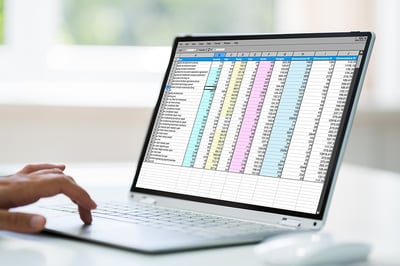Online Database Explained: Uses, Benefits & Setup Guide
8 min read
Topic:
ASP.NET Development Services
An online database is a database that can be accessed via the Internet. For an enterprise, an online database is a method of keeping critical data accessible to employees—or even clients and vendors. An online database may drive an eCommerce site or a customer relationship management suite.
Online databases are usually hosted by a website or a service provider, and they allow users to search for and retrieve data from the database with a web browser. IMDb.com (Internet Movie Database), for instance, is a tremendously large online library database that documents practically every movie ever made.
What is an example of an online database?
There are two things that you can think about when you think of an "online database." There's the implementation of the database and the underlying technology.
For example, Wikipedia is an online knowledge repository. It's essentially a dictionary: a database of terms and the definitions of those terms. But it's not just a website. The terms are dynamically connected to each other. When you look up "horses," for instance, you might get linked to the history of horses, famous horses, and breeds of horses. The information is served dynamically based on context.
But Wikipedia didn't write a database out of whole cloth. Rather, Wikipedia built its database on PHP and MySQL for the database. MySQL is one of the most common technologies for online databases. Other technologies include Microsoft SQL Server, Azure SQL Database which is a cloud database, Google Cloud Datastore, and MongoDB. Most databases are based on SQL (Structured Query Language) a database query language developed by IBM in the 1970s. Others are NoSQL (non-structured data).

What is an online database used for?
Online databases are used for a variety of purposes. They can be used to store information about anything that can be queried online. This includes websites, customers, inventory, and more.
Let's look at a few of the most common use cases for online databases:
Powering website content
If you have ever read newspaper articles online or visited any WordPress blog, for instance, they are powered by an online database. WordPress and DotNetNuke are examples of a CMS (Content Management System). The blog posts, the pages, the comments, and even the plugins are all stored in a database. When you visit a WordPress site, your browser sends a request to the server. The server then queries the database and serves up the content that you've requested. This is much faster and more efficient than hard-coding each page in HTML, and it makes the entire process of updating and managing the website easier. Also, the full-text search capability of databases allows content management systems to have site-wide search capability instead of relying on search engines. Development with content management systems like DotNetNuke is much quicker through the use of templates and third-party widgets.
Storing customer information
An online database application can also be used to store customer information. This might include contact information, purchase history, and more. This information can then be used to track sales & marketing and provide better customer service.
For instance, if you know that a customer has purchased a particular product in the past, you can recommend similar products to them. Or, if you know that a customer has had problems with a product, you can offer them a discount on a different product.
Keeping track of inventory
Another common use case for online database applications is inventory management. If you have a physical store, you'll need to keep track of what products you have in stock. But if you also sell online, it's important to keep track of your inventory in real-time so that you can avoid overselling.
An online database can help you keep track of your inventory levels, so that you always know what's in stock and what needs to be restocked. This information can then be synced with your online store, so that customers always see accurate information about pricing and what's available. Most famous eCommerce stores, like Etsy or eBay, are built on a complex database.
Project management
Online database applications can also streamline project management. For instance, you can use a database to track the progress of a project, store project files, manage workflows, and manage customer requests. This information can then be accessed by anyone who is involved in the project, so that everyone is always on the same page. Project management databases are frequently used by software development teams, but they can be used for any type of project. Users are often presented with a dashboard that tells them what they need to focus on. Notification of key actions keeps team members up to date.
Advantages of an online database
There are many advantages to using an online database. Here are some of the most critical ones.
- Convenient user access from anywhere. An online database can be accessed from anywhere in the world instead of just on your local network, as long as you have an internet connection and the right permissions. This makes it easy for employees to work remotely, and for customers to access information about your products or services. You can even access it on Android and iOS mobile devices.
- Real-time data. An online database provides real-time data, so you can always see up-to-date information about your inventory levels, sales figures, project progress, and more.
- Improved collaboration. Online databases make it easy for team members to collaborate on projects. For instance, multiple users can edit a document at the same time, and changes are automatically saved.
- Better security. Online databases are often more secure than traditional databases because they're hosted in the cloud. This means that your data is backed up and protected from physical damage, like fires or floods.
As with all things, there are disadvantages of an online database, too.
- Some security risks. Although online databases are often more secure than traditional databases, they're not 100% secure. There's always a risk that hackers could gain access to your data. Security risks still exist even if a cloud-based solution has the potential to be more secure.
- Downtime. If the server that hosts your database goes down, you won't be able to access your data. This could be a problem if you need to access your data in an emergency.
Despite these potential disadvantages, the advantages of using an online database usually outweigh the disadvantages. If you're thinking about switching to an online database, or if you're not sure which type of database is right for you, contact a web application developer to get started.
Professional programmers and cloud service providers mitigate many of the potential downsides of an online database. They can secure your database and ensure its uptime through a service-level agreement.
An online database vs. an Excel spreadsheet
 For many organizations, the difference is really between an online database and an Excel spreadsheet. There are pros and cons to both, but ultimately it comes down to what makes the most sense for your organization.
For many organizations, the difference is really between an online database and an Excel spreadsheet. There are pros and cons to both, but ultimately it comes down to what makes the most sense for your organization.
Here are the differences between an online database and an Excel spreadsheet:
An online database is a database that's hosted in the cloud. This means that it can be accessed from anywhere in the world, and that it's backed up and protected from physical damage.
An Excel spreadsheet is a file that's stored on your computer. This means that it can only be accessed by people who have the file, and that it's at risk of being lost or corrupted if something happens to your computer. People tend to email around spreadsheets for collaboration purposes. This can lead to a disaster of one person wiping out another’s work or multiple copies of that data and no one knows which one is the correct copy.
The main advantage of an online database is that it can be accessed from anywhere. The main advantage of an Excel spreadsheet is that it's less expensive to set up and maintain.
There are online spreadsheets that can muddle the waters somewhat. Online spreadsheets like Google Sheets can be accessed through the web, just like an online database. But they still don't allow for the advanced data manipulation that you can achieve through an online database. An online database lets you sort and analyze your data as desired.
Of course, whether you need spreadsheets or an online database really depends on your company and its operations.
How to create an online database
Now that you know the advantages of using an online database, you might be wondering how to create one.
The process of creating an online database varies depending on the type of database you're using. For instance, if you're using a relational database like Microsoft SQL Server, you'll need to design your database schema and write SQL queries to insert, update, and delete data.
Creating an online database can be complex, so it's often best to hire a professional database designer to do it for you. A professional can help you choose the right type of database for your needs and can design, configure, and implement a database that meets your specific requirements giving you the functionality you desire.
Some database engineers and professionals will study for literally years to create databases that are efficient and effective. Without this knowledge, it's easy to create databases that are difficult to maintain or not properly secured.
So, the process of web application development will always begin with software design and architecting the database. You need to engineer the database from the ground up. From there, though, the work isn't over. You still have to maintain the database regularly.

Tips and Tricks for Creating an Online Database
Creating an online database is a complex process, but there are a few things you can do to make it easier:
- Know your software requirements.
Before you start creating your database, you need to know what your requirements are. What kind of data do you need to store? How will you be accessing the data? What are the relationships between the different types of data? What kind of performance do you need? Answering these questions will help you choose the right type of database for your needs and will make it easier to design and implement your database.
- Hire a professional.
As we mentioned earlier, creating an online database is complex. And getting the database design correct is critical to the success of the project. Unless you're a database architect, it's best to hire someone to do it for you. A professional developer can help you choose the right type of database and can design and implement a database that meets your specific requirements.
- Use a schema designer.
If you're using a relational database, you'll need to design your database schema. A schema is a blueprint for your database that defines the structure of your data.
Designing a schema can be complex, so it's often helpful to use a schema designer tool. A schema designer tool, such as the one built into Microsoft SQL Server Management Studio, lets you visually design your database schema and can generate the SQL queries needed to create your database.
- Use stored procedures.
You can think of stored procedures as tiny programs that reside in the database. They are typically a set of instructions written in SQL that do only one thing such as retrieve a record from the database for editing or a set of records to produce a report. However, some stored procedures can be more complex and do more than one thing at a time. The alternative to using stored procedures is to code the SQL into the web application programming language such as ASP.NET C#. This is now recommended because it is error prone. Syntax errors in the SQL can sneak into the code. This is not possible with stored procedures as they are checked for correct syntax when saved. Also, stored procedures tend to run a little faster.
A web developer agency can help you implement these tips and tricks.
Databases with ASP.NET Core
There are two types of databases you can use with ASP.NET Core web apps: relational and non-relational. Relational databases, like Microsoft SQL Server, store data in tables. Non-relational databases, like MongoDB, store data in documents.
ASP.NET Core supports many different databases but is designed to work most efficiently with SQL Server. For Example, you could conceivably use ASP.NET with a Microsoft Access database but it is not recommended to use Access in a web environment.
Regardless, an ASP.NET Core Developer will help you find the best IT solutions that are right for you and get your web application development project off to a great start.
Conclusion: the advantages of an enterprise database
An enterprise database can offer many advantages to a business, including improved security, better collaboration, and real-time data. However, there are also some potential disadvantages to using an online database—largely when it comes to development time and expenditure. It can cost a lot to create an online database, especially if you are not skilled in its development.
But by working with an IT consulting firm, you can get an enterprise database built and secured for your business. Your business software development partner will go over your needs to determine what the right options are for you and to create a database system that works.
To find out more information about our online database development outsourcing capabilities, or if you’d like to discuss your ASP.NET needs with Keene Systems CEO, Lance Keene click here to book a call with him. You can also download our great new eBook - Why ASP.NET Development Services Fuels Business Growth - to learn more about this essential topic.



